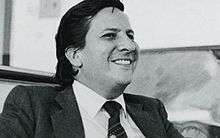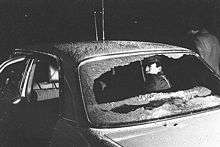Rodrigo Lara
| Rodrigo Lara | |
|---|---|
 | |
| Colombian Minister of Justice | |
|
In office August 7, 1983 – April 30, 1984 | |
| President | Belisario Betancur Cuartas |
| Preceded by | Bernardo Gaitán Mahecha |
| Succeeded by | Enrique Parejo González |
| Personal details | |
| Born |
August 11, 1946 Neiva, Huila, Colombia |
| Died |
April 30, 1984 (aged 37) Bogotá, D.C., Colombia |
| Nationality | Colombian |
| Political party | New Liberalism |
| Spouse(s) | Mary Nancy Restrepo (1974–1984) |
| Children |
Rodrigo Lara Sánchez Rodrigo Lara Restrepo Jorge Andrés Lara Restrepo Paulo José Lara Restrepo |
| Alma mater | Universidad Externado de Colombia |
| Profession | Lawyer |
| Religion | Roman Catholic |
Rodrigo Lara Bonilla (August 11, 1946 – April 30, 1984) was a Colombian lawyer and politician, who served as Minister of Justice under President Belisario Betancur, and was assassinated by orders of Pablo Escobar because of his work as Minister in prosecuting cocaine traffickers mainly belonging to the Medellín Cartel.[1][2]
Lara's death led to Escobar's indictment for murder and a long running controversy over extradition in Colombia that would ultimately cost thousands of lives.
Beginnings
Born in Neiva, capital of the department of Huila, Lara studied law at the Universidad Externado de Colombia. Years later he joined the Liberal Revolutionary Movement party, founded and led by former Liberal president Alfonso Lopez Michelsen. In 1969, when he was only 23 years old, Lara was appointed mayor of his hometown.
Minister of Justice
.jpg)
In August 1983, Lara, who belonged to the New Liberalism created by him and Luis Carlos Galán, was appointed by President Belisario Betancur as Minister of Justice, replacing Bernardo Gaitán Mahecha. Lara, together with Galán, publicly denounced the drug cartels, especially in Medellín, where the cartel was led by Escobar. When Escobar was elected to the Congress, Lara denounced him, citing his connection to drug cartels. Lara also exposed Escobar and the cartel for influencing politics and sports through corruption. This triggered a trap set by some politicians, drug dealers, and journalists who were threatened by the explosive growth of Lara in government and especially in the fight against drug trafficking. Jairo Ortega, Escobar's ally in Congress, presented a check (eventually shown to have been falsified) to the chamber, supposedly drawn by known drug trafficker Evaristo Porras. This, in addition to a recorded conversation between Lara and Porras, caused many to question Lara's legitimacy. President Betancur, however, dismissed the allegations and retained Lara in office.
After the alleged link between Lara and the drug cartels was discredited, the government began uncovering the shadowy dealings of the Medellín Cartel, specifically Escobar. Escobar was expelled from the Congress and his U.S. visa cancelled. The Minister went further, reviving criminal charges against Escobar and other drug lords, such as Carlos Lehder. Lara also ordered the seizure of hundreds of planes and properties that were allegedly used for the production and distribution of illegal substances. While Congress debated approving an extradition treaty with the United States, Escobar and his allies sought to solve their problems by physically eliminating Lara.
Murder

Only eight months after taking the Ministry of Justice post, Lara was gunned down in his car on the night of April 30, 1984,[2] on 127th Street in Bogota, which later was named "Avenida Rodrigo Lara Bonilla" in his honor. The murder occurred at the hands of an assassin sent by Escobar, named Ivan Dario Guisado, who rode on a Yamaha DT175 motorcycle driven by Byron Velasquez, aka "Quesito". Guisado was killed by the minister's bodyguards, while Velasquez was captured by the police and spent more than 10 years in prison.
Consequences
After Lara's death, the Betancur government immediately approved the extradition law and began a war against organized crime. In turn, Enrique Parejo González was appointed Minister of Justice. He directed a harsh attack against drug trafficking, leading to the extradition of three members of the Medellín Cartel to the United States.
In 2009, Rodrigo Lara Restrepo and the sons of the late Luis Carlos Galán announced to the media his forgiveness of Sebastian Marroquin (formerly Juan Pablo Escobar), son of the late Pablo Escobar, who apologized for the damage done to the country in his two decades of narco-terrorism, as told in the documentary film Sins of My Father (2009).
In popular culture
- In the Colombian Caracol TV series Escobar, el Patrón del Mal (2012), Lara is portrayed by the Colombian actor Ernesto Benjumea
- The Netflix TV series Narcos (2015) (Season 1, Episode 3, "The Men of Always"), Lara (played by Mexican actor Adan Canto) is depicted denouncing Escobar and being assassinated
References
- ↑ "El Asesinato de Rodrigo Lara Bonilla" [The Assassination of Rodrigo Lara Bonilla]. Semana (in Spanish). 1987-08-07. ISSN 0124-5473. Archived from the original on Sep 6, 2015. Retrieved 2010-09-29.
- 1 2 Associated Press (May 1, 1984). "Justice Minister slain in Bogota". The New York Times. Archived from the original on May 24, 2015. Retrieved Sep 6, 2015.